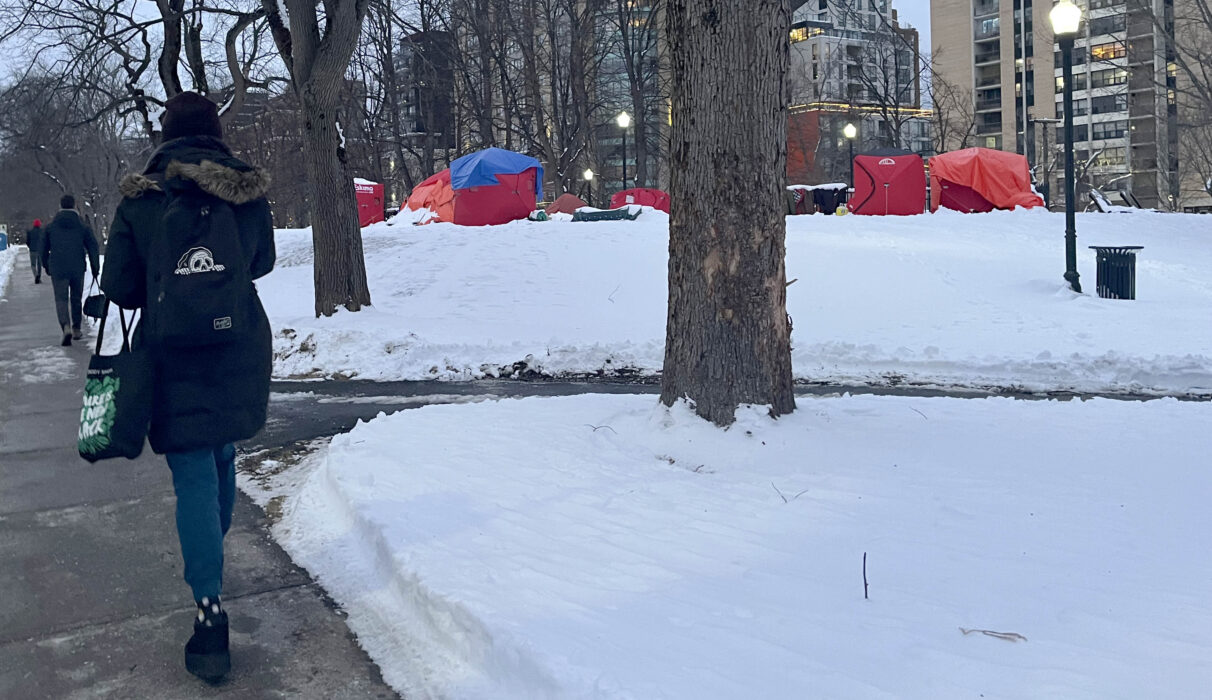Conference hears housing crisis has resulted from ‘systemic exploitation’
Social workers, housing experts criticize government inaction on fixed-term leases, social housing

caption
A woman walks by a row of tents in an encampment of homeless people at Victoria Park in Halifax.The housing crisis and a trend to fixed-term leases in Nova Scotia can be attributed to a provincial housing system fixated on profits, says the executive director of the Nova Scotia College of Social Workers.
“What we have witnessed today is not the failing of individual landlords or bad actors, this is systemic exploitation,” Alec Stratford told a Zoom panel discussion on housing on Monday.
Stratford, who works at the college, the provincial body that regulates the social work profession, was one of nine speakers participating in Understanding the Housing Crisis in Nova Scotia, a discussion hosted online by the college of social workers and the Nova Scotia Action Coalition for Community Wellbeing.
Stratford said the rental and housing crisis is “a byproduct of a marketplace ideology that worships profits while trampling over human rights.”
Social workers and housing experts used the discussion to offer criticisms and potential fixes for the provincial housing crisis that has resulted in low housing vacancy, soaring rents and a growing number of homeless people that as of this month stands at more than 1,000 people in Halifax Regional Municipality, according to the Affordable Housing Association of Nova Scotia.
Catherine Leviten-Reid, a professor of community economic development at Cape Breton University, has researched the issue for a decade and criticized the provincial government’s lack of investment in social housing.
Leviten-Reid said in the 1990s, the federal government pulled back on housing, leaving provincial governments to finance and build new social housing.
“The province of Nova Scotia didn’t step up in response,” Leviten-Reid said. “We had a long period there, decades, where we didn’t have a leader financing the construction of new social housing.”

caption
A group of tents at the homeless encampment in Victoria Park in Halifax that continues to grow as the housing crisis worsens.Other speakers talked about the erosion of tenants’ rights after the elimination of provincial rent control in 1993 and the current and unregulated use of fixed-term leases.
The province’s Residential Tenancies Act says a fixed-term lease is “entered for a fixed period.” While these leases have a starting and ending date, it does not automatically renew once the lease is terminated and a landlord does not need to provide a reason when ending a lease.
Joanne Hussey, a former NDP official who has worked for Dalhousie Legal Aid, was critical of fixed-term leases that allow landlords to get around the five per cent rent cap enacted by the provincial government during the pandemic.
While the rent cap applies to tenants living in the unit, as soon as the tenant moves out of the unit, the rent cap no longer applies, she said.
“So, the result of that is that there is a very significant financial incentive for landlords to find ways to end tenancies of existing tenants,” Hussey said, “They can reset . . . the rent to any amount they want for the next person that moves in.”
Hussey said that most leases in Halifax are fixed-term. She said the province has regulated renovictions in the past and they can also change the rules and control the use of fixed-term leases that have already been regulated in other provinces, like British Columbia.
Trish McCourt, the executive director of the Nova Scotia Non-Profit Housing Association, encouraged attendees to push the government to invest in community housing and enhance the rights of tenants. McCourt said the current housing situation should not be referred to as a “crisis” because it is misleading and inaccurate.
“A crisis is actually something that is sudden and unexpected … and we know it was not unexpected. We know that it was predicted 20 and 30 years ago … it is more than a crisis. It is absolutely something that the government could have and can do something about,”

